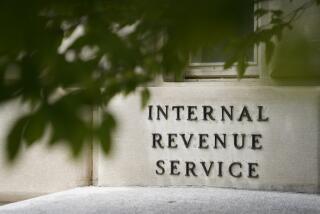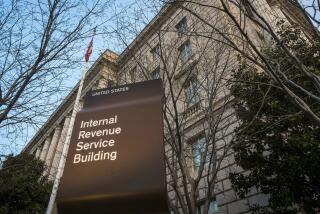Enrolled Agents Specialize in Taxes
- Share via
QUESTION: The certified public accountant who has done our income taxes for eight years retired. My husband doesn’t have much confidence in the man who took over his business, so we are shopping around. I recently heard “enrolled agents” mentioned on a radio program. Neither of us knows anything about them. Can you tell us about their qualifications?--A.W.
ANSWER: Enrolled agents are tax practitioners who qualify for the job either by passing a two-day test of their tax knowledge or by working for the Internal Revenue Service in a technical position for at least five years.
These tax specialists are agents of the taxpayer and are enrolled to practice before the IRS, hence the name.
Like certified public accountants and lawyers, enrolled agents are permitted to represent taxpayers before the IRS in the event of an audit or any other business between the taxpayer and the federal agency.
By all accounts, the exam required for admission to practice before the IRS is stringent. More than two-thirds of those who take the test for the first time don’t pass. And those who join the National Assn. of Enrolled Agents, the trade group for these practitioners, also are required to keep current with changes in the tax laws by taking at least 30 hours of continuing education annually. The IRS has proposed rules requiring all enrolled agents, not just members of the trade group, to satisfy continuing education standards and to periodically renew their enrollment with the IRS.
In short, you may be assured that an enrolled agent has at some point in his or her career had to demonstrate tax competency.
What is impossible to say is how a hypothetical enrolled agent stacks up against a hypothetical individual CPA. To determine that, you would have to check out their credentials, perhaps talk to some of their other clients and talk at some length with each to find out whether you’re comfortable with them and whether you feel confident that they would do a good job.
But generally speaking, enrolled agents are less expensive than CPAs--in part because becoming a CPA requires much more schooling and is a professional designation, both of which command higher fees. Also, CPAs are schooled in accounting and other fields in addition to taxation. Clients of a CPA also pay for the expertise of the entire firm, not just for that of the accountant doing the return. It isn’t unusual for a complex return to go through half a dozen layers of review at a big public accounting firm, a process that isn’t cheap.
So before you start shopping around, take some time to review your own tax situation. Ask yourself how complex it is. Tax practitioners say they often advise clients that, if their return is very simple, an income tax chain such as H&R; Block would be worth considering. If the return has a few complications, an enrolled agent might be the best bet. And if the return is very complicated, it might be worth paying the extra money to see a CPA or tax attorney.
You should also consider whether the designation “CPA” is important to you. Enrolled agents argue that the designation is of little meaning in the field of taxation because the examination that accountants must pass to become certified hardly tests tax knowledge, whereas the enrolled agents’ exam tests nothing but tax knowledge. The extra expense (as much as several hundred dollars), they argue, doesn’t translate into better knowledge or better advice. You must ask yourself whether one will let you sleep better at night than the other.
If you are interested in checking out a few enrolled agents, you can get a list of the trade group members in your area from the National Assn. of Enrolled Agents, 5410 Grosvenor Lane, Bethesda, Md. 20814. The group’s membership comprises 4,200 of the nation’s estimated 30,000 enrolled agents.
Q: I have $150,000 in U.S. Treasury securities deposited in a safekeeping account in a bank. If that bank should fail, are my government notes considered a deposit of the bank and thus insured only up to $100,000? Or is this safekeeping account an entirely different function of the bank since all it does is clip the coupons and deposit the money in my savings account?--H.E.H.
A: Treasury securities are regarded by banks much the same as safe deposit boxes are: They are only in the bank for safekeeping, not for the bank to use. In other words, they aren’t bank deposits and aren’t covered by federal insurance because there is no need for them to be. In the event of a bank failure, the securities would be turned over to their owners in a matter of days, as would insured deposits.
Q: I work in a sophisticated boutique that caters to wealthy women. Nothing in the store is cheaper than $200. My salary doesn’t merit buying such expensive clothes, but I’m expected to appear as though I fit into that income level and dress accordingly. I do get a discount on the clothes. But it still doesn’t come close to covering my clothing expenses. Given the circumstances, can I deduct my clothing costs?--P.R.
A: It is very unlikely. The IRS has consistently disallowed clothing-expense deductions, except in the case of costs for the purchase and upkeep of uniforms that wouldn’t be worn off the job. The tax court has supported the IRS on this point, too. The reasoning is that clothing worn in a boutique can and will be worn for purposes other than work.
More to Read
Inside the business of entertainment
The Wide Shot brings you news, analysis and insights on everything from streaming wars to production — and what it all means for the future.
You may occasionally receive promotional content from the Los Angeles Times.










